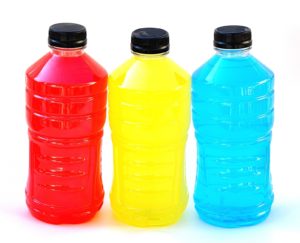11 Jul Sports Drinks Have Their Place…
 With the heat of summer already here and many of us spending time outdoors, a lot of people turn to sports drinks as a way to keep hydrated and refreshed while enjoying outdoor activities. However, those sports drinks are not as healthy as many people believe, especially when it comes to your teeth and gums.
With the heat of summer already here and many of us spending time outdoors, a lot of people turn to sports drinks as a way to keep hydrated and refreshed while enjoying outdoor activities. However, those sports drinks are not as healthy as many people believe, especially when it comes to your teeth and gums.
Sports drinks have their place, but a large percentage of people use them as a replacement for soda thinking they are healthier. But that misguided belief is putting them at a higher risk for cavities, tooth decay, and irreversible damage. Why? Two big reasons: the first one, they are loaded with sugar. Like a ton! One popular brand contains 21 grams of sugar per twelve ounce serving. That’s just over five teaspoons. And the thing is, no one drinks just twelve ounces, they drink anywhere from 32 to 64 or even more! The average American easily consumes over 30 teaspoons of sugar a day. This is worrying not just for your dental health, but overall health in general. Consumption of added sugars in foods and drinks, like sports beverages, are leading to many hidden periodontal dangers.
The second reason sports drinks are problematic is the acidity. The acids in these beverages will over time wear down the enamel causing them to discolor, become overly sensitive, and prone to being easily invaded by bacteria that cause cavities and gum disease. The eroded enamel is also weakened structurally leading to cracks, unevenness, splitting, and even loss. This damage is permanent. You cannot restore enamel. If enamel is damaged so severely, treatment options can include crowns or bonding. The better choice is to practice a few preventative measures.
Some things you can do if you consume any sort of sweetened beverage:
- Use a straw or consume the entire beverage in one sitting.
- Alternate sports drink with water to help neutralize the sugar and acid.
- Rinse your mouth out with water after consumption
- Chew sugar-free gum after drinking
- And if possible, wait 30 minutes and then brush your teeth. Don’t brush immediately after drinking because you can cause even more damage to the dentin beneath the enamel.
These tips are good practice for consumption of any beverage other than water and can be taught to young children as well. As usual, if you notice any changes in your mouth or teeth, contact your dentist immediately. Dental issues are usually easy to prevent, but costly to repair.


